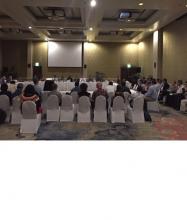Time Out for Bycatch - International panel discussion at annual WCPFC meeting

5 December 2016 | Nadi, Fiji. The importance of bycatch to the stakeholders of the world's largest tuna fishery was demonstrated by a strong showing at a forum on cross-boundary issues in Pacific bycatch management held in conjunction with the annual meeting of the Western and Central Pacific Fisheries Commission (WCPFC) in December. Over 50 participants joined panelists representing four intergovernmental organizations including the Food and Agriculture Organization of the United Nations (FAO), Inter-American Tropical Tuna Commission (IATTC), Agreement on the Conservation of Albatrosses and Petrels (ACAP) and WCPFC. Key heads of delegations (EU, French Polynesia, Japan and the US) and the NGOs ISSF and WWF also joined to consider priority actions for bycatch, and how the Common Oceans ABNJ Tuna Project can assist.
Each year the project convenes a Sharks and Bycatch Consultative Committee meeting to present a review of its progress and seek suggestions on next steps. This year the focus shifted to panelists to give their views on existing management: what is currently working and not working, whether there are critical gaps in the initiatives already underway, and what potential barriers and solutions stand in the way of implementation of improved practices. "As we enter the fourth year of this five-year project, the emphasis needs to be on how best to embed the tools we are producing into the decision-making process", said Technical Coordinator-Sharks and Bycatch Dr Shelley Clarke, who organized the panel discussion. "And to do that we need to know what the stakeholders see as the priorities for the Commission", she added.
During the session, many of the panelists' remarks centered on the need to collect better data on bycatch, through increased longline observer coverage and/or electronic monitoring. The need for better data to establish the scientific basis for action, to address cumulative impacts ocean-wide, and to evaluate whether existing management measures are effective were all mentioned. However, reflecting a theme of ongoing debate within the WCPFC, some speakers pushed back on the idea that more data is the answer, instead referring to trade-offs between target and bycatch monitoring and the need to develop mitigation measures in consultation with fishers. Most commentators considered that bycatch management can be progressed adequately within each individual tuna-RFMO, although some mentioned the value of shared data and coordinated management across the Pacific for some species.
The Common Oceans ABNJ Tuna Project team was pleased to note that many of the priorities mentioned, including shark assessments, turtle and seabird mitigation effectiveness, electronic monitoring and FAD bycatch, are already active areas of work by WCPFC and other Common Oceans ABNJ partners. The main message was thus that the project is working on the right things and needs to keep progressing as there is much still to be done. While sustaining its efforts toward informed, effective and coordinated bycatch management, the project remains poised to respond to opportunities generated by tuna-RFMO members for new national and regional measures.

